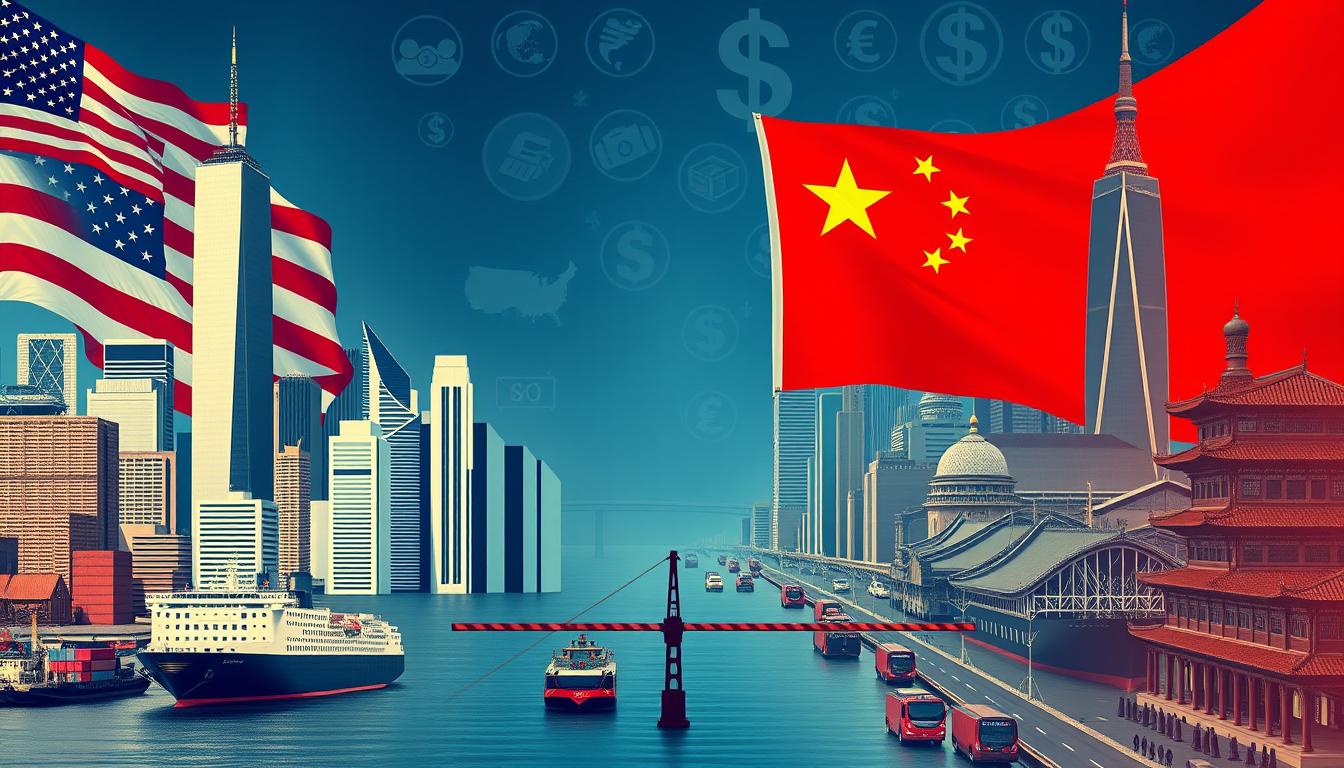The US-China trade war has greatly influenced the global economy. It has caused worries for many countries. The trade war has led to tariffs and counter-tariffs, affecting many industries and economies.
Understanding the US-China trade war’s impact is key for businesses and economies. This article will focus on the trade war’s effects on trade policies and the global market.
The US-China trade war has big consequences. Its effects on the global economy will last for years. The trade war is shaping the future of international trade and commerce.
Understanding the Origins of the US-China Trade Conflict
The US-China trade conflict started with a big trade imbalance. To understand its effects on the global economy, we need to know the main events. The imbalance and concerns about intellectual property led to investigations and tariffs.
Important factors like trade deficits, intellectual property theft, and state-sponsored industries pushed the conflict to grow. These issues led to retaliatory actions, starting a full trade war. The global economy has seen big changes because of this conflict, affecting many industries.
Key Triggering Events
- US investigation into China’s intellectual property practices
- Imposition of tariffs by the US on Chinese goods
- China’s response with its own tariffs on US goods
As the conflict grew, its effects on the global economy became clearer. The trade war hit many sectors, from manufacturing to farming. Knowing how the conflict started helps us understand its global impact.
Initial Trade Policies and Responses
The first trade moves by both sides shaped the conflict. The US put tariffs on Chinese goods, and China did the same on US goods. This back-and-forth raised the stakes of the trade war, affecting the global economy.
The Implications Law of the US-China Trade War on the Global Economy
The US-China conflict has big effects on the world economy. It impacts many areas like manufacturing, farming, and tech. The drop in trade has hurt global growth, jobs, and investments a lot.
Some major effects of the US-China trade war include:
- Decline in trade volumes, affecting industries such as manufacturing and agriculture
- Impact on global economic growth, employment, and investment
- Changes in trade policies and responses from other countries
The economic effects of the US-China conflict are complex and wide-ranging. They need a deep understanding of the trade tensions consequences to handle the shifting global economy.
As the US-China trade war keeps changing, it’s key to keep up with the latest news. This helps us understand how it affects the world economy.
Impact on Global Supply Chains and Manufacturing
The US-China trade war has greatly affected the global market. It has changed how industries operate. Tariffs have made companies rethink their supply chains and where they make things.
Now, companies are moving their manufacturing to avoid high costs. This change is reshaping global supply chains. The main reasons for this shift include:
- Disruption of traditional supply routes
- Increased costs due to tariffs
- Need for diversification of supply chains
The trade war’s impact on manufacturing and supply chains will keep growing. Companies must adjust to these changes. They will look at labor costs, infrastructure, and market access when deciding where to make things.
In summary, the US-China trade war has significantly impacted global supply chains and manufacturing. It has led to a trend of moving manufacturing to other places. Companies will have to find new locations to keep costs down.
Currency Markets and Exchange Rate Dynamics
The US-China trade war has big effects on currency markets and exchange rates. After the trade war, the Chinese yuan’s value went down. This change affects the exchange rates of other currencies too. The value of currencies is closely linked to international trade relations.
Important factors in currency markets and exchange rates include:
- Trade balances and deficits
- Investment flows and capital mobility
- Monetary policy decisions and interest rates
These factors can change currency values. This, in turn, affects international trade relations. As the world deals with the US-China trade war’s effects, understanding currency markets and trade is key.
After the trade war, there might be a new look at international trade relations. There could be stronger trade agreements and more free trade. This could make currency markets more stable and predictable. This is good for businesses and investors.
Effects on International Trade Patterns
The us-china trade war has had big effects on how countries trade with each other. Countries are looking for new partners to avoid tariffs. This change is because of the trade war, which makes it key for nations to find new trade friends.
New trade deals and alliances have popped up because of the trade war. For instance, the US-Mexico-Canada Agreement aims to boost trade among these countries. Also, countries are working on regional economic groups to strengthen their trade ties with neighbors.
Key Changes in Trade Patterns
- Increased trade between the US and Mexico
- Growing trade relationships between China and European nations
- Strengthening of regional trade agreements, such as the Comprehensive and Progressive Agreement for Trans-Pacific Partnership
These changes in international trade patterns come from the us-china trade war. As the trade war keeps changing, we’ll see more shifts in trade. It’s important for businesses and countries to stay flexible and quick to adapt to these changes.
Technology Sector Implications and Innovation Impact
The US-China trade war has big effects on the tech sector. Tariffs have messed up the supply chain for tech companies. This has caused a decline in innovation. Companies are hesitant to invest in research and development because of the trade war uncertainty.
The global economy feels the impact of the trade war, especially in tech. Companies are finding it hard to stay competitive. The US-China conflict’s economic effects are wide-reaching, hitting not just tech but the global economy too.
Some major effects on tech from the trade war include:
- Disruption of supply chains
- Increased costs for companies
- Decline in innovation and research and development
In summary, the tech sector is deeply affected by the US-China trade war. This has big implications for the global economy. As the trade war keeps changing, watching its impact on tech and the economy is crucial.
Agricultural Markets and Food Security Concerns
The US-China trade war has big effects on agricultural markets and food security. Countries around the world are looking for new places to sell their farm products. This change has caused prices to swing wildly and made it harder to get into markets.
The trade war’s impact is clear in how countries are adjusting to the new trade scene. Price changes are a big worry, hitting farmers and shoppers hard. Here are some key points to understand the impact:
- Changes in agricultural trade flows: Countries are looking for new markets, changing global trade patterns.
- Price volatility: The trade war has caused prices to jump up and down, affecting market access for farm products.
- Market access: The trade war has changed who can sell what, with some countries facing export limits.
In summary, the US-China trade war has big effects on farm markets and food safety. As the trade war continues, watching the global market and its impact on farm trade, prices, and access is crucial.
Investment Patterns and Capital Flow Changes
The us-china trade policies impact has changed how investments are made and where money flows. Foreign direct investment has dropped, with companies now more careful about where they invest. This caution is likely to stick around, with a focus on rethinking international trade.
Some key factors influencing these changes include:
- Changes in trade agreements and policies
- Shifts in global economic trends
- Fluctuations in currency markets and exchange rates
These factors make international trade relations complex. It’s vital for businesses and investors to keep up and adjust to these changes.
International trade relations will shape investment patterns and capital flow changes. As countries review their trade deals, there might be chances for more foreign direct investment. This could boost economic growth and development. The us-china trade policies impact will still be felt, but by understanding and adapting, businesses and investors can face challenges and find new opportunities.
Impact on Developing Economies
The US-China trade war is affecting many regions, especially developing economies. These countries face both challenges and opportunities. Emerging markets could gain from the shift in trade and investment.
Some key benefits for emerging markets include:
- Diversification of trade relationships, reducing dependence on traditional partners
- Increased investment in infrastructure and industry, driven by the need for alternative supply chains
- Growing demand for local products and services, as companies adapt to new trade realities
Trade declines and slower growth can lead to less government money, fewer jobs, and more poverty. It’s crucial for these countries to find new ways to grow and thrive.
Consumer Markets and Price Effects
The us-china trade war has had a big impact on consumer markets. The economic effects of the conflict are seen by people all over the world. Tariffs from the US and China have made goods more expensive, leading to less spending by consumers.
Some of the key effects on consumer markets include:
- Increased prices for consumer goods, such as electronics and clothing
- Changes in consumer behavior, with some consumers opting for cheaper alternatives or delaying purchases
- A decline in consumer confidence, as the uncertainty surrounding the trade war continues
The economic effects of the us-china conflict on consumer markets are far-reaching. They affect both businesses and individuals. As the trade war goes on, consumer markets will likely stay unstable. Prices and how people shop will keep changing because of the us-china trade war.
Environmental and Sustainability Implications
The US-China trade war has big effects on the environment and sustainability. Companies are looking for ways to lessen their environmental harm. This has caused changes in carbon footprint as they adjust to the new global market influence.
Some of the key effects on the environment include:
- Changes in supply chains and manufacturing processes
- Increased use of renewable energy sources
- Investment in green technology and sustainable practices
Carbon Footprint Changes
The trade war has pushed companies towards more sustainable ways. They aim to cut their carbon footprint. This has lowered greenhouse gas emissions and made businesses more eco-friendly.
Green Technology Development Impact
The trade war has also boosted green technology development. Companies are investing in research, creating new solutions to environmental issues. This has grown the green technology sector, with leaders like Tesla and Vestas.
Conclusion: The Future of Global Economic Relations
The US-China trade war has changed the game for global economic ties. As things calm down, leaders will work on making trade agreements stronger. They aim to boost free trade and international cooperation.
The war’s effects will still be felt for a long time. It will shape trade levels, economic growth, and where investments go around the world.
The trade war has shown us the need for a stronger, fairer global trade system. The US and China will have to rethink their trade plans. This could lead to new partnerships that fit today’s global economy better.
As we move past this trade conflict, finding common ground will be key. Nations must work together, focusing on growth that benefits everyone. This will require a careful mix of looking out for national interests and global cooperation.

